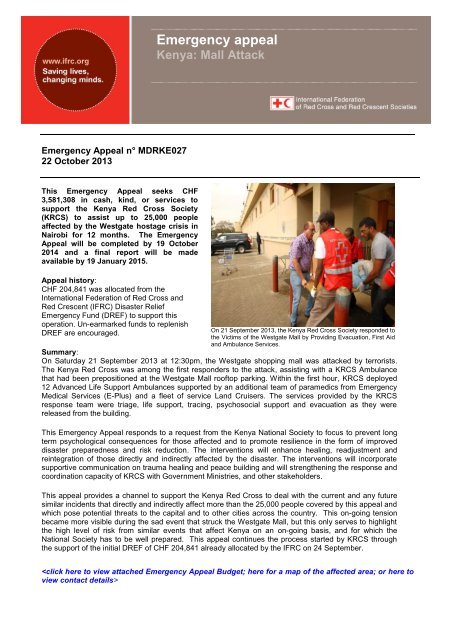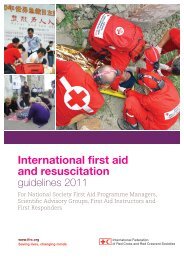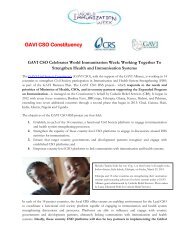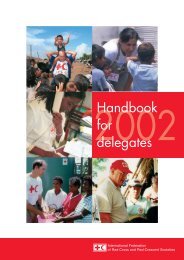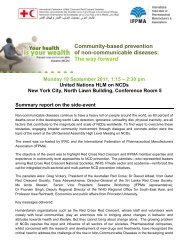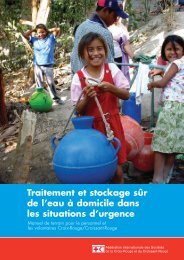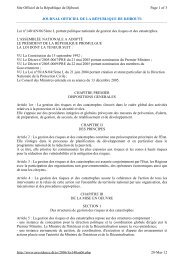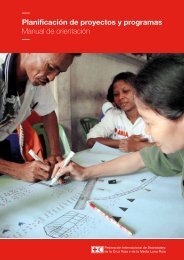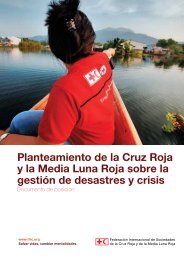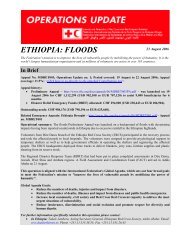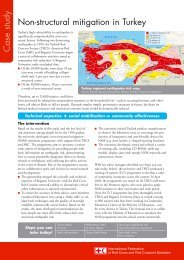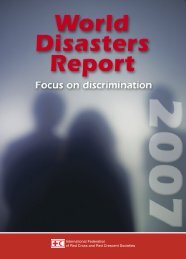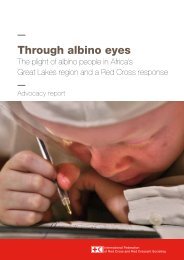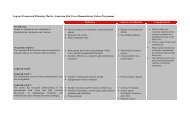MDRKE027 - International Federation of Red Cross and Red ...
MDRKE027 - International Federation of Red Cross and Red ...
MDRKE027 - International Federation of Red Cross and Red ...
You also want an ePaper? Increase the reach of your titles
YUMPU automatically turns print PDFs into web optimized ePapers that Google loves.
Emergency appeal<br />
Kenya: Mall Attack<br />
Emergency Appeal n° <strong>MDRKE027</strong><br />
22 October 2013<br />
This Emergency Appeal seeks CHF<br />
3,581,308 in cash, kind, or services to<br />
support the Kenya <strong>Red</strong> <strong>Cross</strong> Society<br />
(KRCS) to assist up to 25,000 people<br />
affected by the Westgate hostage crisis in<br />
Nairobi for 12 months. The Emergency<br />
Appeal will be completed by 19 October<br />
2014 <strong>and</strong> a final report will be made<br />
available by 19 January 2015.<br />
Appeal history:<br />
CHF 204,841 was allocated from the<br />
<strong>International</strong> <strong>Federation</strong> <strong>of</strong> <strong>Red</strong> <strong>Cross</strong> <strong>and</strong><br />
<strong>Red</strong> Crescent (IFRC) Disaster Relief<br />
Emergency Fund (DREF) to support this<br />
operation. Un-earmarked funds to replenish<br />
DREF are encouraged.<br />
On 21 September 2013, the Kenya <strong>Red</strong> <strong>Cross</strong> Society responded to<br />
the Victims <strong>of</strong> the Westgate Mall by Providing Evacuation, First Aid<br />
<strong>and</strong> Ambulance Services.<br />
Summary:<br />
On Saturday 21 September 2013 at 12:30pm, the Westgate shopping mall was attacked by terrorists.<br />
The Kenya <strong>Red</strong> <strong>Cross</strong> was among the first responders to the attack, assisting with a KRCS Ambulance<br />
that had been prepositioned at the Westgate Mall ro<strong>of</strong>top parking. Within the first hour, KRCS deployed<br />
12 Advanced Life Support Ambulances supported by an additional team <strong>of</strong> paramedics from Emergency<br />
Medical Services (E-Plus) <strong>and</strong> a fleet <strong>of</strong> service L<strong>and</strong> Cruisers. The services provided by the KRCS<br />
response team were triage, life support, tracing, psychosocial support <strong>and</strong> evacuation as they were<br />
released from the building.<br />
This Emergency Appeal responds to a request from the Kenya National Society to focus to prevent long<br />
term psychological consequences for those affected <strong>and</strong> to promote resilience in the form <strong>of</strong> improved<br />
disaster preparedness <strong>and</strong> risk reduction. The interventions will enhance healing, readjustment <strong>and</strong><br />
reintegration <strong>of</strong> those directly <strong>and</strong> indirectly affected by the disaster. The interventions will incorporate<br />
supportive communication on trauma healing <strong>and</strong> peace building <strong>and</strong> will strengthening the response <strong>and</strong><br />
coordination capacity <strong>of</strong> KRCS with Government Ministries, <strong>and</strong> other stakeholders.<br />
This appeal provides a channel to support the Kenya <strong>Red</strong> <strong>Cross</strong> to deal with the current <strong>and</strong> any future<br />
similar incidents that directly <strong>and</strong> indirectly affect more than the 25,000 people covered by this appeal <strong>and</strong><br />
which pose potential threats to the capital <strong>and</strong> to other cities across the country. This on-going tension<br />
became more visible during the sad event that struck the Westgate Mall, but this only serves to highlight<br />
the high level <strong>of</strong> risk from similar events that affect Kenya on an on-going basis, <strong>and</strong> for which the<br />
National Society has to be well prepared. This appeal continues the process started by KRCS through<br />
the support <strong>of</strong> the initial DREF <strong>of</strong> CHF 204,841 already allocated by the IFRC on 24 September.<br />
2<br />
The situation<br />
On Saturday 21 September 2013 at 12:30, an armed group entered Westgate Shopping Mall <strong>and</strong> attacked<br />
members <strong>of</strong> the public with h<strong>and</strong> grenades <strong>and</strong> automatic rifles. Westgate Mall is a popular shopping centre<br />
with the diplomatic community, Kenyans <strong>and</strong> foreign visitors. It is a multi-storey building with a basement <strong>and</strong><br />
ro<strong>of</strong>top parking that also houses mainstream department stores, banks, phone centres <strong>and</strong> electronic shops,<br />
boutiques, c<strong>of</strong>fee shops, movie theatres <strong>and</strong> party/amusement areas.<br />
On an average weekend, the mall has an estimated 10,000 shoppers at lunchtime peak. According to<br />
eyewitness reports, the attack started with a grenade explosion at a cultural event taking place at the ro<strong>of</strong>top.<br />
Heavy gunfire inside the building which lasted for several minutes left scores <strong>of</strong> people dead or injured. KRCS<br />
responded to this attack within minutes.<br />
The response time was enhanced by a KRCS Ambulance prepositioned at the Westgate Mall ro<strong>of</strong>top parking.<br />
Additionally, within the first hour, KRCS deployed 12 Advanced Life Support Ambulances supported by a<br />
team <strong>of</strong> paramedics from Emergency Medical Services (E-Plus) <strong>and</strong> a fleet <strong>of</strong> service L<strong>and</strong> Cruisers. The<br />
services provided by the KRCS respond team were triage, life support, tracing, psychosocial support <strong>and</strong><br />
evacuation as those trapped in the building were rescued or escaped.<br />
The incident received overwhelming support from individuals <strong>and</strong> organizations in various capacities to<br />
support the evacuation process <strong>and</strong> the pre-hospital emergency medical operations. Despite the success,<br />
emergency medical services operations were faced with numerous challenges that limited capacity.<br />
Coordination emerged as a primary challenge in response to the incident. Using this frame <strong>of</strong> reference, it is<br />
evident that both human <strong>and</strong> material resources need to be managed for productivity without which they<br />
easily become a liability to the operation. The lack <strong>of</strong> coordination highlighted that there was no unified<br />
planning, communication was arbitrary <strong>and</strong> activities were sometimes either overlooked or replicated because<br />
responsibilities were not clearly assigned. The response initiatives also suffered a shortage <strong>of</strong> Emergency<br />
Medical Services (EMS) equipment <strong>and</strong> responders were compelled to devise makeshift solutions while<br />
performing their duties, endangering the safety <strong>of</strong> both responders <strong>and</strong> victims. During the response, it was<br />
clear that a coordinated contingency plan would have contributed to a more effective <strong>and</strong> timely result.<br />
Survivors, including responders, families <strong>and</strong> friends <strong>and</strong> other affected community members are increasingly<br />
showing symptoms <strong>of</strong> acute stress symptoms, such as anxiety, disorientation, anger <strong>and</strong> grief. The<br />
unsupported grieving process has created emotional distress, panic attacks <strong>and</strong> anxiety in the families,<br />
relatives <strong>and</strong> friends <strong>of</strong> the bereaved that calls for intensified psychosocial interventions to alleviate the<br />
suffering <strong>and</strong> promote resilience at individual <strong>and</strong> community-level; with a specific focus on the most<br />
vulnerable.<br />
Offering psychosocial support (PSS) in such cases is very important <strong>and</strong> critical in order to promote timely<br />
<strong>and</strong> healthy recovery <strong>and</strong> long term psychosocial wellbeing. The Kenya <strong>Red</strong> <strong>Cross</strong>, working in close<br />
collaboration with a number <strong>of</strong> partners, has been <strong>of</strong>fering PSS in the form <strong>of</strong> Psychological First Aid (PFA)<br />
<strong>and</strong> trauma support, including counselling for people directly affected or involved in the crisis at different sites<br />
close to Westgate, the hospitals <strong>and</strong> the main mortuaries which received the victims.<br />
This Emergency Appeal seeks to continue <strong>and</strong> further exp<strong>and</strong> the provision <strong>of</strong> these services for those<br />
directly <strong>and</strong> indirectly affected. The services will be <strong>of</strong>fered through a number <strong>of</strong> delivery models, including<br />
static sites, mobile sites, roving teams <strong>and</strong> use <strong>of</strong> media. There will be a strong linkage <strong>and</strong> referrals systems<br />
to counselling institutions for continued care <strong>and</strong> support for those that will require the services on a voluntary<br />
basis. The operation will also focus on further strengthening the capacity <strong>of</strong> KRCS in trauma care <strong>and</strong><br />
response through upgrading ambulance services.<br />
Coordination <strong>and</strong> partnerships<br />
The overall level <strong>of</strong> coordination <strong>of</strong> humanitarian work at the Westgate Mall was in partnership with various<br />
government departments, agencies, organizations, media <strong>and</strong> groupings. University <strong>of</strong> Nairobi pathologists<br />
coordinated the viewing <strong>of</strong> bodies in the City Mortuary, while Kenya National Blood Transfusion services<br />
(Ministry <strong>of</strong> Health) <strong>and</strong> Kenya Psychological Association supported the blood donation campaign <strong>and</strong><br />
psychosocial activities respectively. KRCS has continued to work with the relevant organizations <strong>and</strong><br />
agencies such as St John’s Ambulance, Hospitals, <strong>and</strong> Military Disaster Response Unit. Others include the
3<br />
Blood Link Foundation, Hope Worldwide Kenya, Blood Life Initiative Kenya, Save the Children, <strong>and</strong> Child<br />
Welfare Society <strong>of</strong> Kenya.<br />
KRCS is the lead organization m<strong>and</strong>ated by the Government <strong>of</strong> Kenya <strong>and</strong> the Kenya Psychological<br />
association to coordinate Phase II <strong>of</strong> PSS intervention after the attack. Child counselling <strong>and</strong> therapy is part <strong>of</strong><br />
the PSS component. Mapping has been done <strong>and</strong> KRCS is going to tap into the technical capacities <strong>of</strong> other<br />
agencies such as the child welfare <strong>of</strong> Kenya, Save the Children <strong>and</strong> Child Line.<br />
KRCS has started reimbursing hospitals that had admitted casualties <strong>of</strong> the Westgate attack. The money<br />
being disbursed is part <strong>of</strong> the Kenyan Shillings 102,331,349 (CHF 1.07 million) that was raised by Kenyans<br />
under the We Are One initiative for emergency rescue operation. This money was raised through the Mpesa<br />
platform that Safaricom set up following an appeal by the KRCS.<br />
A task force has been set up to ensure that the money raised is properly accounted for. The taskforce<br />
comprised <strong>of</strong> the National Disaster Operations Centre, all the hospitals that provided assistance, ambulance<br />
service providers, Safaricom <strong>and</strong> the KRCS amongst others. The taskforce concluded that the money raised<br />
would be used for medical emergency grants, trauma counselling, ambulance services, blood donor services<br />
<strong>and</strong> long term intervention.<br />
The audit firm Deloitte Touche Tohmatsu Limited has been appointed to review <strong>and</strong> vet all claims by the<br />
hospitals that were involved in treating the victims <strong>of</strong> the Westgate attack. The firm ensured that each bill had<br />
a charge sheet with matching costs charged <strong>and</strong> that bills paid had not been settled by insurance companies<br />
or in cash. It also physically verified patients yet to be discharged <strong>and</strong> whether discharged patients had been<br />
removed from the system.<br />
<strong>Red</strong> <strong>Cross</strong> <strong>and</strong> <strong>Red</strong> Crescent action<br />
The DREF funds covered the immediate response that included emergency response, first aid <strong>and</strong> rescue<br />
efforts, including efforts to reduce the number <strong>of</strong> deaths from the Westgate Mall attack, reduce delays in<br />
blood donation services <strong>and</strong> for referrals to secondary <strong>and</strong> tertiary care centres providing emergency care to<br />
victims. The initial short term activities also aimed to reduce the psychosocial effects <strong>of</strong> the attack among<br />
those directly affected <strong>and</strong> among the general public.<br />
KRCS mounted various activities in response to the attack, including a one- week countrywide blood donation<br />
drive, psychosocial support services across various hospitals within the city, tracing <strong>and</strong> restoration <strong>of</strong> family<br />
links <strong>and</strong> a 24-hour comm<strong>and</strong> centre at the Visa Oshwal Centre; in the vicinity <strong>of</strong> the Westgate Mall.<br />
Blood donation: KRCS mobilized partners across the country for a nationwide blood donation exercise from<br />
22 - 27 September. The areas covered included Nairobi, Nakuru, Kisumu, Garissa, Thika, Nyeri, Meru,<br />
Muranga, Kiambu, Laikipia, Embu, Kericho, Kisii, Kakamega, Busia <strong>and</strong> Kirinyaga The total number <strong>of</strong> blood<br />
units collected from the <strong>Red</strong> <strong>Cross</strong> drive was 15,323 units. During the campaign, members <strong>of</strong> the public<br />
walked into various blood transfusion centres <strong>and</strong> hospitals countrywide <strong>and</strong> donated a total <strong>of</strong> 1,907 units <strong>of</strong><br />
blood; bringing the total units <strong>of</strong> blood collected in the entire campaign to 17,230 units.<br />
Psychosocial support (PSS): For the week 21 – 28 September 2013, the cumulative number <strong>of</strong> people<br />
reached with psychosocial support was 2,500. PSS services were provided at Visa Oshwal Centre, Uhuru<br />
Park, MP Shah Hospital, Avenue Hospital, <strong>and</strong> Aga Khan Hospital. The target group included the general<br />
public, children from the nearby schools, patients still admitted in health institutions <strong>and</strong> staff from Westgate<br />
shops. Consultations are on-going between KRCS, partners <strong>and</strong> other stakeholders to strategize targeted<br />
services including support to setting up counselling drop-in centres, mapping <strong>of</strong> referral systems for provision<br />
<strong>of</strong> specialized services to those in need.<br />
KRCS continues to work in collaboration with the Kenya Psychological Association <strong>and</strong> other partners to <strong>of</strong>fer<br />
continued psychosocial support including counselling services to the survivors.<br />
During the emergency phase, members <strong>of</strong> the security forces <strong>and</strong> other first responders that include media<br />
<strong>and</strong> general public received one-<strong>of</strong>f counselling <strong>and</strong> would not have access to these services days after the<br />
main incident.
4<br />
During the immediate phase <strong>of</strong> the emergencies, acute stress problems are best managed without medication<br />
in line with principles <strong>of</strong> psychological first aid. The approach used involved non-intrusive emotional support,<br />
coverage <strong>of</strong> basic needs, protection from further harm <strong>and</strong> organization <strong>of</strong> social support networks.<br />
Tracing services: Kenya <strong>Red</strong> <strong>Cross</strong> has a m<strong>and</strong>ate to trace <strong>and</strong> restore family links during disaster <strong>and</strong><br />
emergency situations. This important service has been <strong>of</strong>fered to the affected families that visit the tracing<br />
centres at Visa Oshwal, various hospitals across the city <strong>and</strong> morgues. The procedure is to open a case file<br />
whenever an individual visits the tracing desks or a call is made to KRCS tracing hotline by an enquirer<br />
reporting the loss <strong>of</strong> contact with a loved one. This is followed by activation <strong>and</strong> correlation <strong>of</strong> information<br />
gathered from various centres including hospitals <strong>and</strong> morgues. Once the details <strong>of</strong> the victim match those<br />
provided by the enquirer, the latter is informed accordingly, necessary action taken <strong>and</strong> the file closed. A file<br />
is also closed when the tracing desks establishes that conducts have been established between the enquirer<br />
<strong>and</strong> the missing person.<br />
To date, KRCS tracing desks still has 31 open files on enquiries <strong>of</strong> missing persons from members <strong>of</strong> the<br />
public relating to the Westgate attack. The tracing team has made continuous follow-up with the relatives to<br />
confirm the status <strong>of</strong> the missing persons <strong>and</strong> appeal to relatives to revert back in case contacts were reestablished.<br />
The needs<br />
The widespread effects <strong>of</strong> the Westgate Mall incident will continue for some time for different facets <strong>of</strong> the<br />
community affected, including responders, families <strong>and</strong> communities <strong>of</strong> victims, as well as members <strong>of</strong> the<br />
general public. The incident underscored multiple new challenges in addressing terrorist attacks<br />
characterized by mass casualties, prolonged suffering <strong>and</strong> anxiety <strong>and</strong> high dem<strong>and</strong>s on response resources.<br />
In order to create an enabling social <strong>and</strong> physical environment, the psychosocial support component will<br />
contribute to resilience <strong>and</strong> reduction in vulnerability for those who were affected either directly or indirectly.<br />
Restoration <strong>of</strong> social structures through support groups, recreational activities <strong>and</strong> referral linkages will<br />
enhance stability <strong>and</strong> allow people to cope with the effects <strong>of</strong> the terror attack <strong>and</strong> return to their normal day<br />
to day activities, family life <strong>and</strong> supportive roles for each other. KRCS plans to set up call in centres, static<br />
sites, mobile sites, outreach programs <strong>and</strong> use <strong>of</strong> media. There will be a strong linkage <strong>and</strong> referrals created<br />
with counselling institutions for continued care <strong>and</strong> support for those that will require the services.<br />
There is therefore a critical need to sustain psychosocial support <strong>and</strong> psychological education (raising<br />
awareness on the potential psychological reactions to an emergency context) as well as for service providers<br />
to always have capacity for quality lifesaving timely response through:<br />
• Enhanced institutional capacities in terms <strong>of</strong> hardware/infrastructure, <strong>and</strong> s<strong>of</strong>tware/skilled personnel.<br />
• Ensuring sustainable ambulance services are equipped <strong>and</strong> upgraded, with consumables replaced.<br />
(This is critical because we do not know when the next incident will occur).<br />
• Formation <strong>of</strong> PSS support groups for the survivors<br />
• Intervention counselling for special categories.<br />
• Group sessions for KRCS volunteers, staff, organizations, school children etc.<br />
• Recreational activities for children to enable them develop a positive social <strong>and</strong> physical<br />
environment for recovery <strong>and</strong> development<br />
• Referrals pathways, linkages, collaboration <strong>and</strong> networking for continued support.<br />
• Continued follow up for the selected cases by the social workers <strong>and</strong> volunteer psychologists<br />
<strong>and</strong> lay-counsellors.<br />
• Capacity building initiatives for National Disaster Response Team <strong>and</strong> County Disaster<br />
Response Team on Advanced Trauma Life Support (ATLS) <strong>and</strong> Advance Cardiac Life<br />
Support (ACLS) <strong>and</strong> management <strong>of</strong> dead bodies.<br />
• Upgrading advance life support ambulances.<br />
• Establishing psychosocial support drop-in centres, call centres, working with other<br />
partners/service providers)<br />
There was a gap in the response capacity <strong>and</strong> turnaround time for key services such as the blood donor<br />
services that were very crucial in the response to this type <strong>of</strong> an emergency. KRCS has for over 40 years
5<br />
been a key partner to government on blood safety, contributing to the mobilisation <strong>of</strong> more than 50% <strong>of</strong> blood<br />
collected annually. KRCS has contributed to the mobilization <strong>and</strong> recruitment <strong>of</strong> Voluntary Non Remunerated<br />
Blood Donors (VNRBD), retention <strong>of</strong> repeat donors, infrastructural support to government <strong>and</strong> advocacy on<br />
blood safety policy. The Westgate Mall attack has put the Kenya National Blood Transfusion Service<br />
(KNBTS) under considerable strain. KNBTS functions on its routine capacity even during emergency<br />
situations. There is a need to build capacity <strong>of</strong> the KNBTS to be better able to respond to emergencies in<br />
terms <strong>of</strong> training <strong>and</strong> replacement <strong>of</strong> essential equipment. KRCS, in its role as auxiliary to Government, is<br />
committed to ensure that blood service has the capacity to respond to a similar scale emergency.<br />
Beneficiary selection:<br />
The survivors<br />
The programme will target the Westgate survivors who were directly or indirectly affected by the terror attack.<br />
This will include patients in hospitals, bereaved individuals <strong>and</strong> their families. Other groups will include:-<br />
<br />
<br />
<br />
<br />
<br />
The media personnel that reported the incident.<br />
The shop owners <strong>and</strong> staff.<br />
KRCS staff <strong>and</strong> volunteers.<br />
Organizations <strong>and</strong> learning institutions located in the neighbourhood <strong>of</strong> Westgate Mall.<br />
Security personnel<br />
Children affected by the attack<br />
During the Westgate attack, many children had congregated for a cookery competition, while many more<br />
were with their parents doing shopping or in restaurants. The incident has already manifested in behavioural<br />
change. The affected children were from different economic, cultural <strong>and</strong> religious backgrounds, a factor that<br />
KRCS has considered in its deployment <strong>of</strong> counsellors. Because every child reacts to traumatic events<br />
differently, it is important to listen <strong>and</strong> try to underst<strong>and</strong> children’s unique perspectives <strong>and</strong> concerns, as well<br />
as those <strong>of</strong> the family. Those unfamiliar with mental health care may be reluctant to seek help <strong>and</strong> may need<br />
time to convey their concerns about treatment before they are ready to seek it. Education will be provided to<br />
parents <strong>and</strong> care givers on stress management <strong>and</strong> coping mechanisms.<br />
KRCS Volunteers <strong>and</strong> Staff<br />
KRCS staff <strong>and</strong> volunteers lead by the Secretary General were the first to arrive the terror attack scene. As<br />
they arrived on the scene they were confronted with dead bodies as well as badly injured victims, whom they<br />
assisted. Evacuation was done by the Emergency Medical Services paramedics who together with medical<br />
doctors set up a triage on the basement <strong>of</strong> the Visa Oshwal Mall. Psychological First Aid was provided to<br />
team <strong>of</strong> responders as a stop gap measure. The entire team will be targeted for follow up PSS to manage<br />
Post Traumatic Stress Disorder <strong>and</strong> referrals for those in need <strong>of</strong> specialized attention.<br />
The Search <strong>and</strong> Rescue Teams, Hospital <strong>and</strong> Ambulance Workers<br />
The health workers including doctors, nurses, ambulance staff, <strong>and</strong> other staff involved in the medical care <strong>of</strong><br />
the mass casualties from the Westgate attack. The sheer number <strong>of</strong> casualties that they attended to has<br />
impacted on their mental health. Some types <strong>of</strong> traumas affect a whole community, thus affecting the helping<br />
pr<strong>of</strong>essional both directly <strong>and</strong> indirectly through their clients’ experiences. The KRCS E-plus <strong>and</strong> St. John<br />
among other ambulance firms carried out pre-hospital care to those they took to the hospital. As they<br />
reassured the causalities they were exposed to horrific tales from the victims. This has a lasting effect on<br />
them <strong>and</strong> will also require psychosocial support, including peer support <strong>and</strong> in some cases counselling. The<br />
hospitals that were heavily involved are The Aga Khan, Guru Nanak, MP Shah, Forces Memorial <strong>and</strong> Nairobi<br />
Hospitals.<br />
Trauma psychologists <strong>and</strong> community counsellors<br />
The trauma psychologists <strong>and</strong> community counsellors will be targeted through supervision, group therapy<br />
sessions <strong>and</strong> team building aimed at creating a better acquainted <strong>and</strong> equipped team to provide PSS services<br />
to the survivors. They will be appreciated <strong>and</strong> given tokens <strong>of</strong> appreciation when the operation comes to an<br />
end.
6<br />
Immediate needs<br />
The immediate needs for the emergency included evacuation for the affected, security, access to basic<br />
services such as First Aid, psychosocial support including referral to pr<strong>of</strong>essional mental health services,<br />
blood services, referrals <strong>and</strong> medical care. Kenya <strong>Red</strong> <strong>Cross</strong> Society in collaboration with the government <strong>of</strong><br />
Kenya <strong>and</strong> other stakeholders provided a wide range <strong>of</strong> services in the response to the above mentioned<br />
needs. This immediate response was funded by DREF <strong>and</strong> money mobilized from the public through<br />
Safaricom MPesa mobile phone funds transfer services.<br />
Some <strong>of</strong> the activities planned under this Emergency Appeal include: setting up <strong>of</strong> drop-in centres to facilitate:<br />
referrals, provision <strong>of</strong> individual <strong>and</strong> group psychosocial support including lay-counselling <strong>and</strong> recreational<br />
play centres for children, crisis hotline, setting up <strong>of</strong> call centres, provision <strong>of</strong> psychosocial support <strong>and</strong><br />
pr<strong>of</strong>essional assistance awareness creation sensitization <strong>and</strong> psycho education <strong>and</strong> tracing <strong>and</strong> restoration <strong>of</strong><br />
family links.<br />
Longer-term needs<br />
There are increasing signs <strong>of</strong> acute traumatic stress in the survivors <strong>and</strong> other affected groups including<br />
responders, their friends, families <strong>and</strong> relatives. This is further exacerbated by broken family links as a result<br />
<strong>of</strong> missing persons after the attack on the Westgate Mall. There is need to strengthen the capacity <strong>of</strong> KRCS,<br />
relevant line ministries <strong>and</strong> other partners in psychosocial support interventions during emergencies, trauma<br />
care <strong>and</strong> response. This will include addressing personnel capacities, systems strengthening <strong>and</strong> structural<br />
support.<br />
This Emergency Appeal seeks to build on the existing <strong>Red</strong> <strong>Cross</strong> <strong>Red</strong> Crescent Movement expertise <strong>and</strong><br />
capacities in psychosocial support <strong>and</strong> trauma care response in emergencies. The appeal will focus on<br />
comprehensive roll out <strong>of</strong> PSS level II to level IV, which will focus on community <strong>and</strong> family support, including<br />
non-specialized support as well as specialized services.<br />
This Appeal also aims to strengthen the response capacity <strong>and</strong> coordination for Kenya <strong>Red</strong> <strong>Cross</strong> with<br />
government ministries <strong>and</strong> other stakeholders, one <strong>of</strong> the strategies aims to better equip KRCS Emergency<br />
Medical Services (EMS) ambulances. The EMS ambulances were in the frontline during the recent response<br />
due to their ability to respond to the needs <strong>of</strong> most <strong>of</strong> the casualties that needed resuscitation, in transit,<br />
oxygen supply <strong>and</strong> cardiac support. It is imperative that any vehicle used as an ambulance be designed <strong>and</strong><br />
equipped to respond to medical emergencies <strong>and</strong> in non-emergency situations. The vehicle must comply with<br />
international EMS st<strong>and</strong>ards <strong>and</strong> also state or local laws governing the licensing <strong>and</strong> certification <strong>of</strong> an<br />
emergency medical transportation vehicle. This call for investing in well-equipped ambulance units <strong>and</strong> well<br />
trained paramedics. Through this Appeal, KRCS intends to upgrade the number <strong>of</strong> advance life support<br />
ambulances from the current 12 units to 33 units in preparedness to h<strong>and</strong>le future mass casualty incidences<br />
through procurement <strong>and</strong> placement <strong>of</strong> assorted life support equipment.<br />
Finally, in situations such as the Westgate attack, a contingency planning involving all key stakeholders is<br />
essential. KRCS plans to facilitate a contingency planning process with Government Ministries, NGOs <strong>and</strong><br />
other key stakeholders to clearly outline roles <strong>and</strong> responsibilities to ensure good coordination <strong>and</strong> avoid<br />
duplication.<br />
In total, 600 volunteers will be involved in the operation to date. From the onset <strong>of</strong> the attack, 500 volunteers<br />
were involved in the initial response. Some 65 volunteers will be involved in the PSS activities 200 volunteers<br />
will be engaged in the broader response <strong>and</strong> some 300 volunteers are involved in the blood related activities.<br />
The proposed operation<br />
Emergency health <strong>and</strong> care<br />
Outcome: Promote the restoration <strong>of</strong> community networks <strong>and</strong> coping mechanisms<br />
Outputs (expected results)<br />
Activities planned
7<br />
Increase awareness <strong>of</strong><br />
psychological reactions<br />
(Psycho education) during<br />
<strong>and</strong> following disasters <strong>and</strong><br />
or social disruptions to<br />
25,000 population<br />
<br />
<br />
<br />
<br />
<br />
Carry out a needs assessment to establish the number<br />
<strong>and</strong> extent <strong>of</strong> psychosocial needs<br />
Mass media campaigns; Production <strong>and</strong> airing <strong>of</strong> radio<br />
spots <strong>and</strong> television (TV) advertisement.<br />
Creation <strong>of</strong> awareness through sensitisation <strong>and</strong> psycho<br />
education.<br />
Production <strong>of</strong> Information Education <strong>and</strong> Communication<br />
(IEC) materials.<br />
Commemoration event.<br />
Facilitate Psychosocial<br />
support to 11,850 people <strong>and</strong><br />
650 staff/volunteers <strong>of</strong> the<br />
KRCS as needed.<br />
<br />
<br />
<br />
<br />
<br />
<br />
<br />
Provide post deployment psychosocial support including<br />
lay-counselling to the 500 law enforcers <strong>and</strong> security<br />
personnel<br />
Provide Psychosocial support to 68 bereaved families<br />
Psychosocial support activities for children involved <strong>and</strong> or<br />
exposed to the crisis (this will be done through schools<br />
ten schools under this Emergency Appeal).<br />
Provision <strong>of</strong> psychosocial support including pr<strong>of</strong>essional<br />
mental health interventions to 200 survivors.<br />
Provide psychosocial support to 1000 people directly<br />
affected by the emergency.<br />
Provide psychosocial support to 10,000 friends <strong>and</strong><br />
relatives <strong>of</strong> the people directly affected by the emergency.<br />
Psychological support for the Responders (Ambulance<br />
staff, media)<br />
Referrals <strong>and</strong> linkages for rehabilitative care<br />
Provide psychological support to 150 staff <strong>and</strong> 500<br />
volunteers <strong>of</strong> KRCS engaged in emergency response.<br />
Disaster Preparedness & Risk <strong>Red</strong>uction<br />
Outcome: KRCS preparedness <strong>and</strong> capacity to respond to disasters <strong>and</strong> emergency<br />
situations is enhanced<br />
Outputs (expected results)<br />
Activities planned<br />
Strengthening the response<br />
capacity <strong>and</strong> coordination<br />
KRCS with Government<br />
Ministries, <strong>and</strong> other<br />
stakeholders<br />
<br />
<br />
<br />
<br />
<br />
<br />
<br />
Training <strong>of</strong> KRCS management on PSS programming in<br />
emergencies.<br />
Training <strong>of</strong> KRCS National Disaster Response Teams<br />
(NDRTs) <strong>and</strong> County Disaster Response Teams (CDRTs)<br />
on PSS response.<br />
Training <strong>of</strong> KRCS NDRTs <strong>and</strong> CDRTs on Advanced<br />
Trauma Life Support (ATLS) <strong>and</strong> Advance Cardiac Life<br />
Support (ACLS) <strong>and</strong> management <strong>of</strong> dead bodies.<br />
Development <strong>of</strong> National contingency plans for sudden<br />
onset disaster.<br />
Documentation <strong>and</strong> dissemination <strong>of</strong> lessons learnt <strong>and</strong><br />
best practices.<br />
Establishment <strong>of</strong> a reference centre<br />
Project management (Financial Management, Monitoring<br />
<strong>and</strong> evaluation, supervision, reporting <strong>and</strong> overall project<br />
administration )
8<br />
Provide support to the Kenya<br />
National Blood Transfusion<br />
Service<br />
<br />
<br />
<br />
Procurement <strong>of</strong> assorted equipment/items <strong>and</strong> materials<br />
such as blood bags, alcohol swabs etc. (Eplus, Kenya<br />
National Blood Transfusion Services [KNBTS])<br />
Support biannual National Blood drives.<br />
Training <strong>of</strong> relevant Government Ministries on disaster<br />
response <strong>and</strong> psychosocial interventions (KNBTS,<br />
Ministry <strong>of</strong> Health (MOH) – Emergency Centre).<br />
Upgrade the number <strong>of</strong><br />
advance life support<br />
ambulances from the current<br />
12 units to 33 units in<br />
preparedness to h<strong>and</strong>le<br />
future mass casualty<br />
incidences<br />
<br />
<br />
<br />
Lease sufficient ambulances to ensure sufficient coverage<br />
Procure <strong>and</strong> install upgraded equipment for 33 vehicles<br />
(including lifesaving equipment such as ventilators, cardio<br />
monitors <strong>and</strong> defibrillators <strong>and</strong> radio equipment)<br />
Monitor the use <strong>and</strong> maintain the equipment as required<br />
Communications – Advocacy <strong>and</strong> Public information<br />
Through the External Relation <strong>and</strong> the Public Relations Office, KRCS aims to coordinate various<br />
awareness <strong>and</strong> publicity activities, to sensitize the public <strong>and</strong> media on the psychosocial needs <strong>of</strong> the<br />
victims, family members, friends <strong>and</strong> community <strong>of</strong> the Westgate Mall. Project beneficiaries <strong>and</strong> the<br />
public in general will be updated on assessments <strong>and</strong> programme activity plans <strong>and</strong> necessary<br />
feedback received through meetings, committees <strong>and</strong> Information Education <strong>and</strong> Communication<br />
materials.<br />
Planned Activities<br />
• Produce regular information bulletins <strong>and</strong> share with relevant stakeholders.<br />
• Facilitate media field trips to activity sites.<br />
• Monitor media coverage on the psychosocial support <strong>and</strong> other programme activities.<br />
• Produce IEC materials on psychosocial support.<br />
• Produce <strong>and</strong> air radio, print adverts/supplements on KRCS interventions.<br />
• Social media monitoring <strong>and</strong> updates.<br />
• The launch <strong>of</strong> this appeal <strong>and</strong> other major milestones throughout the operation will be<br />
highlighted on IFRC website.<br />
• KRCS will jointly work with IFRC to implement humanitarian diplomacy <strong>and</strong> advocacy<br />
activities on behalf <strong>of</strong> the Westgate victims, their friends <strong>and</strong> families.<br />
Capacity <strong>of</strong> the National Society<br />
Kenya <strong>Red</strong> <strong>Cross</strong> Society has 67 branches, six regional <strong>of</strong>fices <strong>and</strong> over 70,000 volunteers. The<br />
National Society has capacities at regional <strong>and</strong> district level to make an initial response which can<br />
later on be reinforced by headquarter re-enforcement both in human <strong>and</strong> material terms. Many <strong>of</strong> the<br />
regions have disaster response plans in place, developed based on the local context. KRCS has<br />
responded to sudden onset disaster with mass casualties ranging from the 1998 bomb attack on the<br />
Nairobi US embassy, Sinai fire incident, collapsed building in various parts <strong>of</strong> the country <strong>and</strong> the<br />
recent Westgate Mall attack.<br />
KRCS has implemented activities for preparedness. For example, the Disaster Risk <strong>Red</strong>uction (DRR)<br />
project in Nairobi branch has been implemented to prepare the volunteers on rapid response, search<br />
<strong>and</strong> rescue, lifesaving skills <strong>and</strong> incident comm<strong>and</strong>. This project assisted in the recent Westgate Mall<br />
attack where KRCS was on site to save life within minutes <strong>of</strong> the attack.
9<br />
Capacity <strong>of</strong> the IFRC<br />
The <strong>Federation</strong>’s Eastern Africa <strong>and</strong> Indian Ocean Isl<strong>and</strong>s Regional Representation is located in<br />
Nairobi, Kenya <strong>and</strong> will provide technical support to the operations through its Technical Support Unit<br />
consisting <strong>of</strong> disaster management, health <strong>and</strong> water <strong>and</strong> sanitation specialists. Several Movement<br />
partners have specialized expertise in psychosocial support. These partners will be enlisted as<br />
necessary to provide specialized technical support. The operation will also be supported in reporting,<br />
resource mobilization <strong>and</strong> communications through the IFRC representation. The Africa Zone <strong>of</strong>fice<br />
will provide additional support as required.<br />
Budget summary<br />
See attached budget (Annex 1) for details.<br />
Walter Cotte<br />
Under Secretary General<br />
Programme Services Division<br />
Bekele Geleta<br />
Secretary General<br />
Contact information<br />
For further information specifically related to this operation please contact:<br />
Kenya: Mr. Abbas Gullet, Secretary General, Kenya <strong>Red</strong> <strong>Cross</strong> Society, email:<br />
gullet.abbas@kenyaredcross.org Phone 254.20.60.35.93; 254.20.60.86.81/13 Fax:<br />
254.20.60.35.89<br />
Kenya: East Africa Regional Office; Finn Jarle Rode, Regional Representative, East<br />
Africa, Nairobi, phone: +254.20.283.5124; fax: 254.20.271.27.77; email:<br />
finnjarle.rode@ifrc.org<br />
IFRC Zone: Daniel Bolaños, Disaster Management Coordinator, Africa; phone: +254<br />
(0)731 067 489; email: daniel.bolanos@ifrc.org<br />
IFRC Zone Logistics Unit: Rishi Ramrakha, Head <strong>of</strong> zone logistics unit; Tel: +254<br />
733 888 022/ Fax +254 20 271 2777; email: rishi.ramrakha@ifrc.org<br />
For Resource Mobilization <strong>and</strong> Pledges:<br />
<br />
IFRC East Africa Regional Representation Office: Diana Ongiti, Senior RM Officer;<br />
phone: +254 20 2835 276 email: diana.ongiti@ifrc.org<br />
For Performance <strong>and</strong> Accountability (planning, monitoring, evaluation <strong>and</strong> reporting):<br />
IFRC Zone: Robert Ondrusek, PMER Coordinator, Africa phone: +254 731<br />
067277; email: robert.ondrusek@ifrc.org<br />
How we work<br />
All IFRC assistance seeks to adhere to the Code <strong>of</strong> Conduct for the <strong>International</strong> <strong>Red</strong> <strong>Cross</strong><br />
<strong>and</strong> <strong>Red</strong> Crescent Movement <strong>and</strong> Non-Governmental Organizations (NGOs) in Disaster<br />
Relief <strong>and</strong> the Humanitarian Charter <strong>and</strong> Minimum St<strong>and</strong>ards in Disaster Response (Sphere)<br />
in delivering assistance to the most vulnerable.<br />
The IFRC’s vision is to inspire, encourage, facilitate <strong>and</strong> promote at all times all forms <strong>of</strong>
10<br />
humanitarian activities by National Societies, with a view to preventing <strong>and</strong> alleviating human<br />
suffering, <strong>and</strong> thereby contributing to the maintenance <strong>and</strong> promotion <strong>of</strong> human dignity <strong>and</strong><br />
peace in the world.<br />
The IFRC’s work is guided by Strategy 2020 which puts forward three strategic aims:<br />
1. Save lives, protect livelihoods, <strong>and</strong> strengthen recovery from disaster <strong>and</strong> crises.<br />
2. Enable healthy <strong>and</strong> safe living.<br />
3. Promote social inclusion <strong>and</strong> a culture <strong>of</strong> non-violence <strong>and</strong> peace.
EMERGENCY APPEAL 22/10/2013<br />
Kenya: Mall Attack (<strong>MDRKE027</strong>)<br />
Budget Group<br />
Multilateral Response<br />
Inter-Agency Shelter<br />
Coord.<br />
Bilateral Response<br />
Appeal Budget CHF<br />
Shelter - Relief 0<br />
Shelter - Transitional 0<br />
Construction - Housing 0<br />
Construction - Facilities 0<br />
Construction - Materials 0<br />
Clothing & Textiles 0<br />
Food 0<br />
Seeds & Plants 0<br />
Water, Sanitation & Hygiene 0<br />
Medical & First Aid 1,229,283 1,229,283<br />
Teaching Materials 0<br />
Ustensils & Tools 0<br />
Other Supplies & Services 0<br />
Emergency Response Units 0<br />
Cash Disbursments 0<br />
Total RELIEF ITEMS, CONSTRUCTION AND SUPPLIES 1,229,283 0 0 1,229,283<br />
L<strong>and</strong> & Buildings 0<br />
Vehicles Purchase 0<br />
Computer & Telecom Equipment 0<br />
Office/Household Furniture & Equipment 5,667 5,667<br />
Medical Equipment 0<br />
Other Machiney & Equipment 0<br />
Total LAND, VEHICLES AND EQUIPMENT 5,667 0 0 5,667<br />
Storage, Warehousing 8,640 8,640<br />
Dsitribution & Monitoring 0<br />
Transport & Vehicle Costs 32,817 32,817<br />
Logistics Services 0<br />
Total LOGISTICS, TRANSPORT AND STORAGE 41,457 0 0 41,457<br />
<strong>International</strong> Staff 0<br />
National Staff 0<br />
National Society Staff 499,444 499,444<br />
Volunteers 9,267 9,267<br />
Total PERSONNEL 508,711 0 0 508,711<br />
Consultants 268,711 268,711<br />
Pr<strong>of</strong>essional Fees 0<br />
Total CONSULTANTS & PROFESSIONAL FEES 268,711 0 0 268,711<br />
Workshops & Training 728,122 728,122<br />
Total WORKSHOP & TRAINING 728,122 0 0 728,122<br />
Travel 0<br />
Information & Public Relations 138,000 138,000<br />
Office Costs 132,632 132,632<br />
Communications 2,444 2,444<br />
Financial Charges 2,000 2,000<br />
Other General Expenses 305,703 305,703<br />
Shared Support Services 0<br />
Total GENERAL EXPENDITURES 580,780 0 0 580,780<br />
Partner National Societies 0<br />
Other Partners (NGOs, UN, other) 0<br />
Total TRANSFER TO PARTNERS 0 0 0 0<br />
Programme <strong>and</strong> Supplementary Services Recovery 218,577 0 0 218,577<br />
Total INDIRECT COSTS 218,577 0 0 218,577<br />
TOTAL BUDGET 3,581,308 0 0 3,581,308<br />
Available Resources<br />
Multilateral Contributions 0<br />
Bilateral Contributions 0<br />
TOTAL AVAILABLE RESOURCES 0 0 0 0<br />
NET EMERGENCY APPEAL NEEDS 3,581,308 0 0 3,581,308<br />
EMERGENCY APPEAL BUDGET V2011.07
<strong>MDRKE027</strong><br />
22 October 2013<br />
Kenya: Westgate Critical Incident<br />
South Sudan<br />
Ethiopia<br />
Congo DR<br />
Ug<strong>and</strong>a<br />
Somalia<br />
Kenya<br />
!<br />
Nairobi<br />
Rw<strong>and</strong>a<br />
Burundi<br />
Tanzania<br />
0 100 50<br />
km !I<br />
The maps used do not imply the expression <strong>of</strong> any opinion on the part <strong>of</strong> the <strong>International</strong> <strong>Federation</strong> <strong>of</strong> <strong>Red</strong> <strong>Cross</strong> <strong>and</strong> <strong>Red</strong> Crescent Societies or National Societies concerning<br />
the legal status <strong>of</strong> a territory or <strong>of</strong> its authorities. Map data sources: ESRI, DEVINFO, GIST, <strong>International</strong> <strong>Federation</strong> <strong>MDRKE027</strong>.mxd - Map produced by DMU/NBO<br />
!J<br />
Affected area


